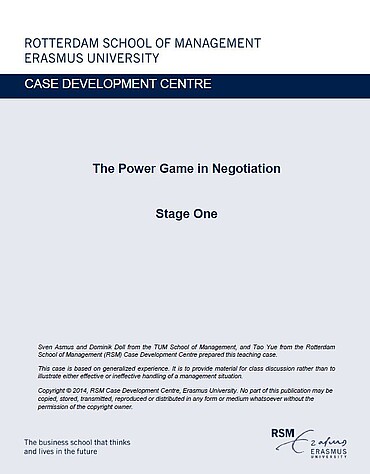Citation Note
Based on generalised experience; 8 pages.
Follow the 'handle' link to access the Case Study on RePub.
For EUR staff members: the Teaching Note is available on request, you can contact us at rsm.nl/cdc/contact/
For external users: follow the link to purchase the Case Study and the Teaching Note.
description
The Hamburg-based family business, Schultz & Co, is negotiating a large contract with the multinational firm, Nordic Wind Company, a major player in the wind power installation market. This three-stage, two-party negotiation simulation engages students in a power game, and helps them understand the dynamics of relationship and influence. It also provides a calculation mechanism that incorporates a cash evaluation for negotiation outcomes.
usage
This case provides unique material (in the form of a three-stage role simulation) to understand the importance about power, power change, influence and relationships in negotiations.
Objective
The case serves the following main objectives: 1. To understand the impact of influence and power on negotiation. 2. To practice using and changing power structures to best position oneself in a negotiation. 3. To understand the interdependency between relationship building and negotiation atmosphere, as well as negotiation outcome. 4. To practice the process of establishing long-term relationships in order to negotiate effectively.
Abstract
The case Nordic Wind Power is a scorable two-party negotiation simulation that takes place over three stages. It is about the potential for a pilot wind power installation project between the multinational enterprise (MNE) Nordic Wind Company, as one of the major players for wind power installations, and the Hamburg-based family business Schultz & Co. Each stage is designed in a way that the negotiation simulation can progress independent from the outcomes achieved in previous stages. The simulation provides a calculation mechanism without using artificial utility points for each issue, instead incorporating a simple discounted cash flow (DCF) evaluation for negotiation outcomes. The teaching focus of this case is about power, power change, influence, and relationships in negotiations.
